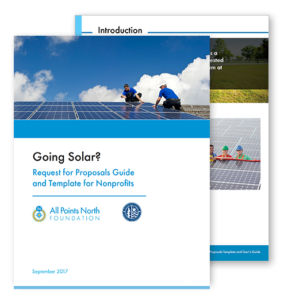Phase 3: Contractor Selection, Solar Installation
Review Proposal Bids and Choose Your Contractor
Generally there are two main components to assess when reviewing bidders’ proposals: responsiveness and responsibility. How well did the bidder address the scope of work you detailed in your RFP? How qualified is the bidder to perform the scope of work? While not essential, you may want to use a scoring matrix to determine the winning proposal.

There generally are two main components of an RFP to review: responsiveness and responsibility.
Responsiveness
Responsiveness of a bidder is determined by how well they address the scope of work put forth in the RFP. For example, if the project calls for 5kWdc of solar production on the roof, then the proposal should include a design and price for a 5kWdc rooftop system. Please note that the system may be slightly less or more than the 5000 watts DC since solar panels come in various sizes and wattages (which change year to year) and the best fit and price for your system can only be determined by a detailed layout at the time. A contractor may propose something other than what has been detailed in the RFP, but it is up to each organization to determine if it would be in their best interest to consider a wide range of design proposals or limit responsiveness of a proposal to a narrowly defined scope. Only limit the scope if you are sure your RFP size and design is exactly what you need based on detailed analysis. Generally, it is a good idea to accept alternative proposals. For instance, a contractor may propose an alternate PV panel that produces less energy, but costs significantly less. It could be in your best financial interest to pick the alternative.
Responsibility
Responsibility of a bidder is determined by how qualified they are to perform the scope of work. What qualifications the bidder must possess also are at the discretion of the organization. Basic qualifications are laid out in the sample RFP template, but additional qualifications might include whether or not the contractor is local, how many projects the contractor has completed before, references from past project owners, a contractor’s willingness to work with staff, how many years the contractor has been in business, how easy they are to get a hold of, etc. It is important that an organization determine the best value for its unique situation and goals.
Professional credentials are one indication of a PV installer’s knowledge and qualifications.
The North American Board of Certified Energy Practitioners (NABCEP) offers a well-respected voluntary certification program for PV installers.
Although it’s not essential, an organization may want to use a scoring matrix or criteria to determine the winning proposal. Keeping it vague means that subjective criteria can be used when choosing the contractor, but not having criteria may also make it difficult to choose a winner if there are several qualified responses.
Not all solar contractors will work with all financing mechanisms. For example, a contractor may focus on only purchases, and some may offer and/or specialize in solar leases and power purchase agreements (PPA). Some states do not allow PPAs. It will be important that the RFP describe any special requirements around financing that a contractor will need to be aware of or include in the proposal.
All Points North Foundation provides grants for U.S.-based projects and initiatives that support our priorities: improving public middle school education and teacher training, and implementing effective solar programs and/or projects.
Have a U.S.-based project you’d like to discuss?

